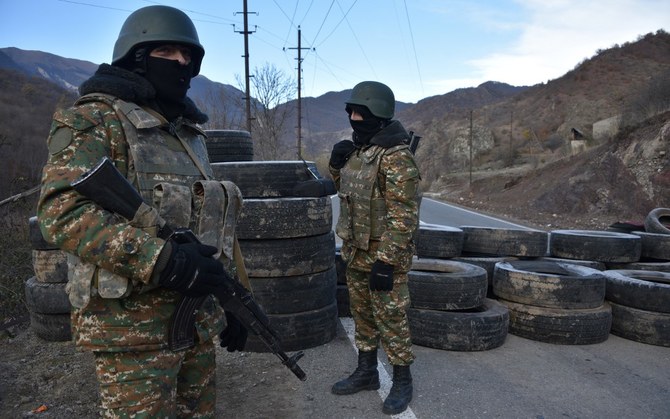LONDON: Four Syrian nationals have claimed they were sent into battle in the Nagorno-Karabakh conflict as mercenaries, despite only enlisting for sentry duties in Azerbaijan.
The claims, made directly to the UK’s BBC, come as Turkey and Azerbaijan deny using mercenaries in the Nagorno-Karabakh war.
In August, people in rebel-held areas of northern Syria were told that there was paid employment overseas.
One of the Syrians told the BBC: “I had a friend who told me that there is a very good job you can do, just to be at military checkpoints in Azerbaijan.”
Another said: “They told us our mission would be to serve as sentries on the border — as peacekeepers. They were offering $2,000 a month. It felt like a fortune to us.”
Both enlisted for the work through Turkish-backed rebels that make up the Syrian National Army, a group opposed to the regime of President Bashar Assad.
The civil war in Syria caused an economic breakdown and a decline in wages, and few people in the region now earn more than $1 a day. As a result, the promised salary seemed like a “godsend,” one of the Syrians said.
Recent estimates say that between 1,500 and 2,000 men enlisted and traveled to Azerbaijan via Turkey on a military aircraft.
However, the men were deliberately misled. They were being recruited for war, despite many having no military experience. The deadly ruse was discovered when they were taken to the front line and ordered to fight.
One of the Syrians said: “I didn’t expect to survive. It seemed like a 1 percent chance. Death was all around us.”
Azerbaijan and its regional ally Turkey have denied using mercenaries in the conflict. However, researchers have gathered a photographic evidence, drawn from videos and images posted online by fighters, that reveals a different story.
The Syrians were deployed on the southern side of the Azeri line, where both sides suffered heavy casualties. The fighters told the BBC that they “came under heavy fire” and were traumatized by their experiences. They chose to remain anonymous for fear of reprisal from military higher-ups.
“My first battle began the day after I arrived,” said one.
“Myself and about 30 guys were sent to the front line. We walked for about 50 m when suddenly a rocket landed near us. I threw myself to the ground. The shelling lasted for 30 minutes. Those minutes felt like years. It was then that I regretted coming to Azerbaijan,” he said.
“We didn’t know what to do or how to react,” said another fighter, who added that he and many of his fellow recruits had almost no experience of war, let alone military training.
“I saw men dying, and others who just went running. They didn’t have any sense of where they were going, because they were basically civilians,” he said.
The four men claim Syrian recruits were provided with almost no protective equipment or medical support. Many fighters bled to death from wounds that medics could have treated, they added.
“The hardest moment was when one of my mates was hit,” said a fighter who was later hospitalized after suffering shrapnel wounds. “He was 20 m away from me when the shell landed. I saw him fall. He was calling to me and screaming. But his spot was exposed to the Armenian machine guns. I couldn’t help him. In the end he just died there.”
Another Syrian fighter said he was “paralyzed by fear” when the shelling began.
“I remember I just sat on the ground and cried, and my injured friends started to cry as well,” he said. “One guy suffered a shrapnel wound on his head. He died right there. Every day I see this. When it comes to me, I sit and cry, even now. I don’t know how I survived this war.”
Estimates of the Syrian death toll in the conflict vary. Official figures report a total of 2,400 casualties on the Armenian side and nearly 3,000 on the Azeri side. But Azerbaijan does not acknowledge that Syrians were among the dead.



























